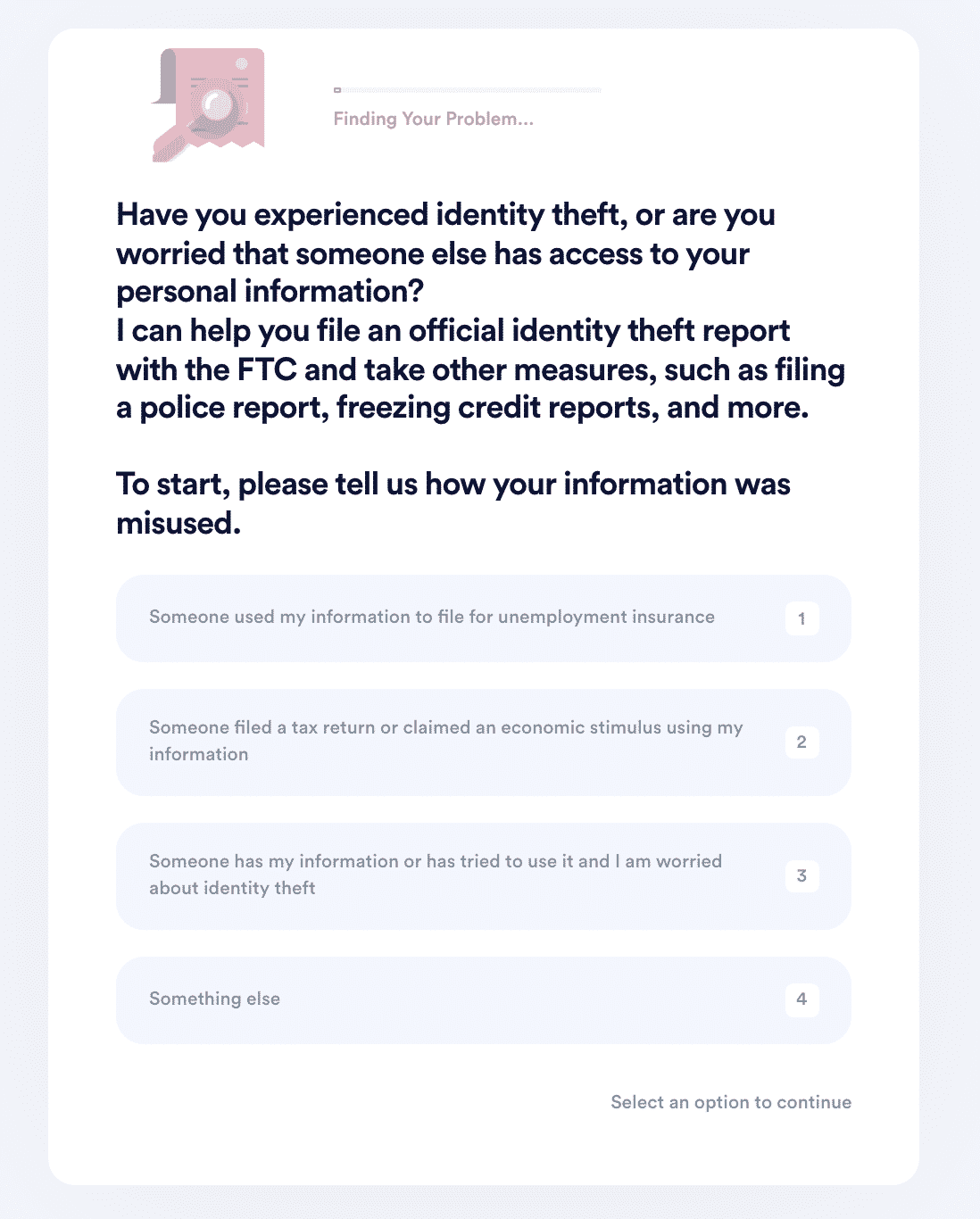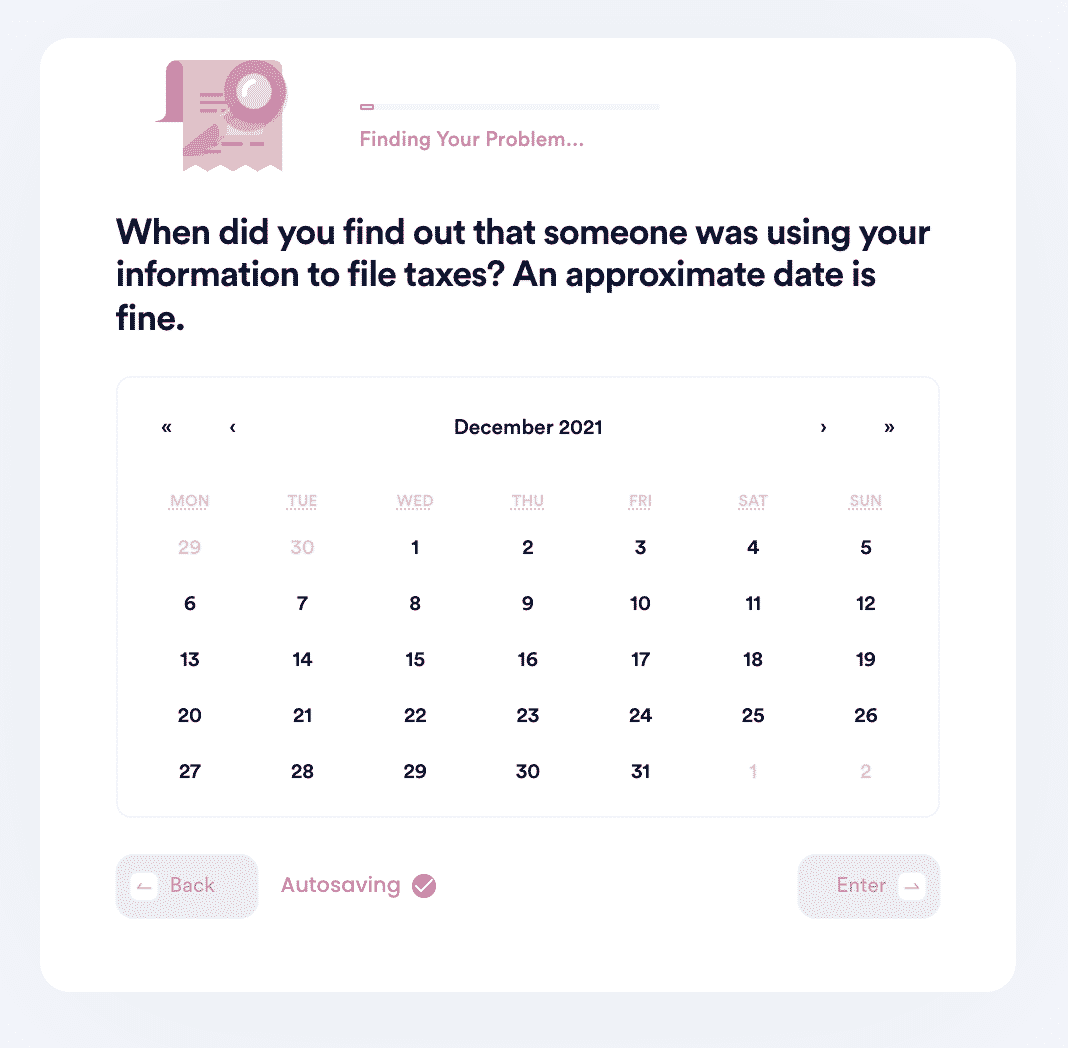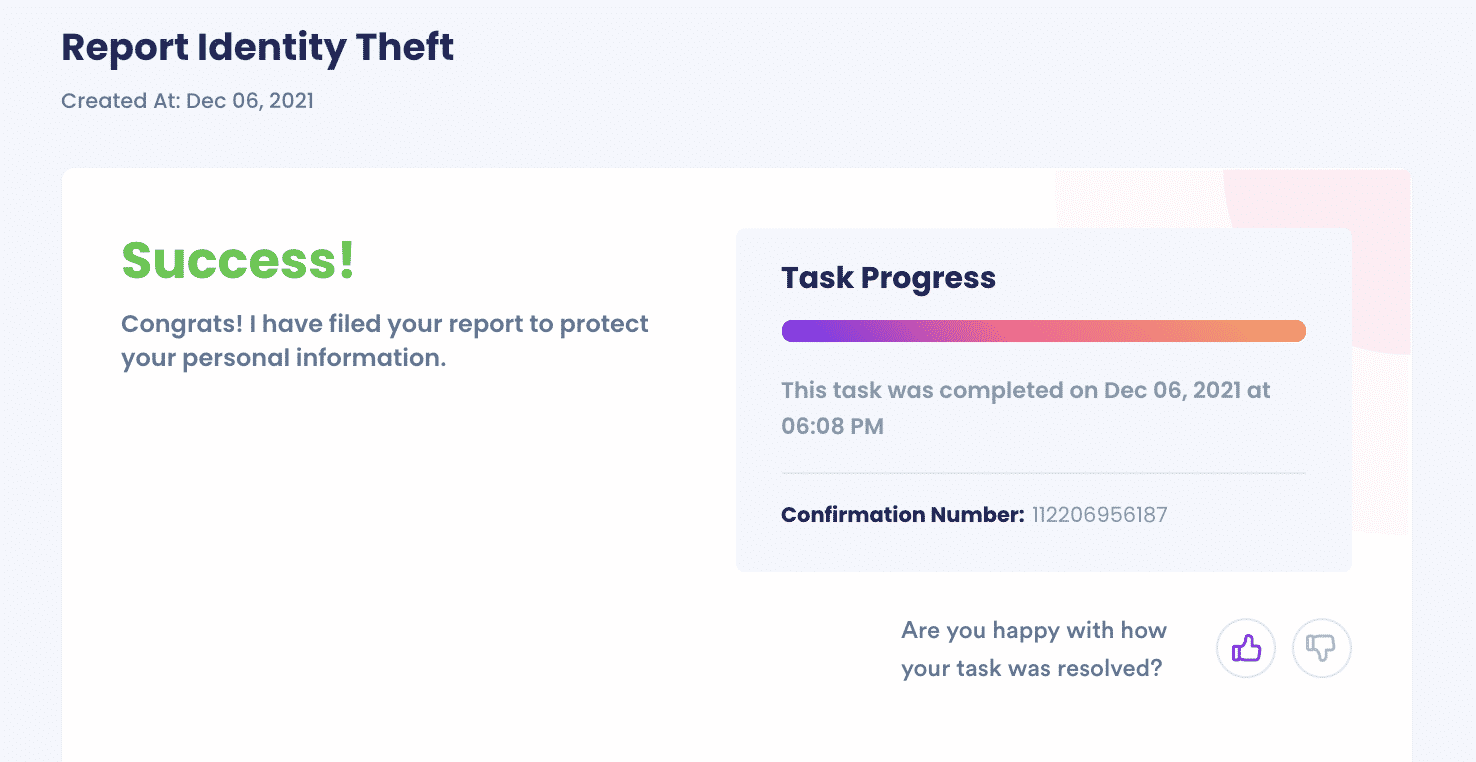How to Report Identity Theft In Miami — the Easy Way
In the modern world, the internet, without a doubt, has made life easier and more convenient. It provides a platform for running services such as banking, online education, communication, entertainment, e-commerce, cloud computing, and cloud storage, among many others.
However, identity theft has become a major concern in the current virtual world. Some people illegally obtain the personal information of a stranger, and use it to make unauthorized transactions.
In , identity theft is a felony punishable by fines and a jail term not exceeding 15 years imprisonment. DoNotPay can help protect your privacy online from malicious people who intend to inflict damage to your finances as well as your reputation. Through the new Identity Theft product, we'll walk you through each report you should file and the steps you should take to make sure your information stays protected.
Signs that You May be a Victim of Identity Theft
A victim of identity theft may not immediately realize it. Here are several warning signs that could alert you to your identity being stolen:
- Presence of unfamiliar activity on your credit card If you notice any inconsistencies in your credit card statements that you did not make, then you have a reason to be alarmed.
- The presence of unexpected charges in your bank account This is one of the most obvious signs that your identity is being stolen. An unexpected charge could mean that someone has gained access to your bank account.
- Getting medical bills for unknown services A criminal may use your identity to receive medical care.
- Being contacted by debt collectors Receiving messages and calls from debt collectors about debts you are unfamiliar with is also an obvious sign of identity theft.
- Changes in your email Missing emails like bank statements and invoices are also an indicator that a hacker is using your identity.
What to Do If Your Identity Is Stolen
Once you have proved beyond any doubt that your identity has been stolen, you have to take measures to avoid more damage being inflicted upon you. Some of these measures include:
- File a claim with your identity theft insurance If you have an insurance plan, you should report it as soon as possible.
- Notify companies about the theft of your identity The relevant companies where transactions have been made without your consent should be alerted immediately. This will prevent any further transactions using your identity from being carried out.
- Report to the Federal Trade Commission The FTC gathers information on cases regarding identity thefts. This information is then used by law enforcement agencies to track down the criminal. To file a report with the FTC, you should visit their website at www.identity theft.gov.
- File a report with Miami Police Department You should file a report with the Miami Police Department and ensure that a copy is handed to you. This copy will act as proof that you are a victim of identity theft.
- Place a fraud alert on your credit reports The next step is placing a fraud alert on account of your credit bureaus.
- Freeze your credit This will restrict access to your credit report. The credit bureaus will also not share it with any other person who asks for it.
- Sign up for a credit monitoring service You may be offered complimentary credit monitoring if your information was accessed illegally. Such a service monitors your credits and alerts you in case suspicious activity is detected.
- Strengthen the security of your accounts You should review your passwords and ensure that they are strong enough to withstand any attempted breaches in your accounts.
- Review your credit reports for suspicious accounts You should check your credit reports for any accounts you are unfamiliar with. After your personal information has been stolen, it may be sold on the dark web, meaning that you may become a victim once again in the future.
- Inspect your credit card and bank statements for any unfamiliar charges Ensure you scan your bank statements for charges that you did not authorize. In case you notice unfamiliar charges, contact and notify the institution of the problem so that the account is closed.
How to Prevent Identity Theft
The best way to secure your privacy is by signing up for an identity theft protection service. This kind of service not only protects your privacy but also alerts you the moment identity theft happens, thus reducing the damage caused. Apart from subscribing to an identity theft service, there are other ways to guard your privacy. They include:
- Freezing your credit The moment you freeze your credit file, no one can look or ask for your credit report.
- Collect mail daily Some identity theft criminals, rather than using sophisticated methods to steal your personal information, simply steal your information from your mailbox, such as bank statements, utility bills, medical care bills, among many others. Criminals may also change your mailing address, so you have to stay vigilant in case you don't receive any expected mail.
- Check your credit card and bank statements regularly You should take some time to review your credit card and bank statements. A hacker with your credit card information or bank account information can make some small changes to your account to test whether they can get away with it before actually causing a lot of damage to your finances.
- Create different strong passwords for your accounts You should ensure that your passwords for different accounts are not the same. You should also refrain from using passwords like your birth date, telephone number, your name, or initials because they can be easily breached. Moreover, you should ensure your password is strong enough to withstand any attempted security breaches.
- Wipe your electronics before donating You should wipe your electronics before donating because deleted files can be traced and reassembled with a data recovery program until they are overwritten with new data.
- Shred documents containing your personal information before getting rid of them Some criminals are willing to go up to the extent of searching through your trash to get your personal information from documents. It is, therefore, advisable to shred these types of documents to avoid exposing your personal information to such criminals.
How to Report a Case of Identity Theft in Miami by Yourself
Filing a police report when your identity has been stolen will initiate an investigation to restore your credit as well as your reputation. You should visit the Miami Police Department and follow the procedure stated below:
- Obtain a copy of your identity theft report from the FTC This will help in setting up a recovery plan.
- Provide your ID as proof of your identity Your passport or driver's license can be used to prove your identity.
- Provide your address by submitting proof such as utility statements or mortgages.
- Provide proof of your identity theft Submit anything that documents that you are a victim of identity theft.
How to Report Identity Theft in Miami Using DoNotPay
Dealing with an identity theft issue, as explained above, can be frustrating at times. However, with the help of DoNotPay, the issue can be resolved in three easy steps:
- Search "identity theft" on DoNotPay and select the type of incident you would like to report.

- Tell us more about the incident that occurred, including the location, date, time, financial loss, and any suspect information you may have.

- We'll identify whether you should file an FTC report, contact the IRS, freeze your credit report, contact state agencies, or file a police report. Once we guide you through the best options, we'll automatically submit the reports on your behalf!

And that's it. DoNotPay will make sure your issue gets sent to the right place. We'll upload confirmation documents to your task for you to view, and if the contacts need more information, they will reach out to you personally via email or mail.
Why Use DoNotPay to Solve Your Identity Theft Issue
DoNotPay is the best platform to tackle this issue of identity theft. There are several reasons that make it the best solution, and they include:
- DoNotPay is easy
- DoNotPay is successful
- DoNotPay is fast
What Else Can DoNotPay Do?
Helping you with your Miami identity theft case is just one of the many things DoNotPay can do. Here is a list of other things that DoNotPay can help you with:
| Get to learn more about identity theft | Educate you on how to report identity theft | Know what to do if someone filed for unemployment under your name |
| Learn about credit card fraud | Educate you on social Security identity theft | Learn what to do if someone has stolen your stimulus check |
| Learn about Equifax identity theft | Learn about Experian identity theft | Learn about how much money you can send demand letters to for in identity theft cases |
Conclusion
Why hesitate? Use today and get your identity theft issue resolved within no time.


